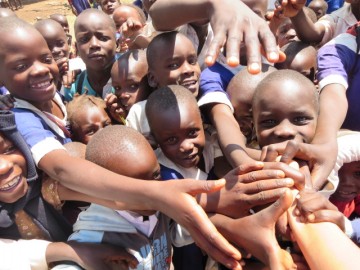By Clarus Leung, 2nd year UBC medical student (Class of 2016)
In the summer of 2013, my teammates and I represented the GIVE Kenya (Global Initiative for Village Empowerment) group in our volunteer journey to Kanyawegi, a rural village in Kenya. Over the course of 6 weeks, we collaborated with Community Strategy, a Kenyan initiative that aims to decentralize health care and improve its accessibility to families of the rural village. The backbone of Community Strategy is formed by a group of dedicated and hardworking volunteer Community Health Workers (CHWs) who act as an important link between the healthcare system and the 50-100 households in their designated village.
On the 35th day of the project, I had the privilege of shadowing Theresa (a CHW) with the hope of understanding some of the evident health challenges around the village. The day was both physically and emotionally demanding. The houses were not situated close together and there was no geographical map of the village. At times, as we made the difficult trek on unpaved roads, across wide maize fields, and over small hills, it could take up to 20 minutes to get from one home to another. At every household, Theresa assessed important health indicators such as water sanitation, hygiene, and waste disposal. She also performed home-based care by providing personalized counseling on health needs, facilitating drug administration, and performing hygiene checks for those in need. We must have visited over 30 houses that day, and out of them, there was one that really stood out in my mind. It was one of the most defining moments of my time in Kenya.
As we approached the home, a simple mud house with a straw roof, I noticed that the field was empty of livestock and agriculture. Inside, there was not a proper latrine or clean water source. There were also very few household items such as pots, pans, cooking charcoal, or mats. The house defined poverty. As we entered, Theresa cordially greeted an old man who was sitting alone. Initially, I wondered why it seemed that this man did not notice my presence (a stark contrast from other villagers who were very friendly in welcoming their guests). It was not until Theresa verbally introduced me as her accompanying guest that the man realized that I was in his home. Moreover, it was only then, as he slowly and carefully felt his way toward the sound of my voice, that I realized he was actually blind. As he reached out to me, I held his rough hand firmly. He could not return my eye contact, but he was very sincere as he warmly smiled and said in English: “Welcome, welcome. Thank you for coming.”
The inside of the house had a very strong, foul odor. As I looked around, I saw a very sickly, thin body lying on the couch, but I could not see much as she was covered by a thick blanket. She was too weak to respond to Theresa’s questions or the old man’s voice. At one point during the visit, she managed to lift up her fragile upper arm, which was mere skin wrapped around bone. She made some painful grunts and then remained silent. As we were about to leave, the man shook my hand again and said: “Thank you, thank you, thank you.” On our way out, I saw the burial site of the family members casted over by a white, wooden cross. It brought tears to my eyes.
I soon learned the heartbreaking story behind this family. The old man was the husband of the house, and he had a wife who was also quite elderly. They had six children, but three of them had sadly passed away due to accidents or diseases, leaving them with only three daughters. Two of the daughters were working in town to make money for the family and the third daughter, Judy, was the thin girl on the couch. Judy was severely ill with AIDS and Tuberculosis. Theresa explained that the foul smell of the house was due to Judy’s uncontrolled incontinence. She had been sick for quite some years now, unfortunately, and the family had not been able to afford the proper medication for her. The family could only afford a medication regime for one or two months at a time and so her condition had been progressively worsening. Indeed, the family was caught in an unfortunate cycle. The blind man and his wife, elderly in appearance but merely in their 50s, were losing the physical capacity to perform household duties and to manage their crops. The burden of caring for their daughter was so great that the couple had no time to maintain a job and generate income. With little support, the family had insufficient funds to make ends meet, let alone to cover costly medications for Judy’s conditions or expensive surgeries for the man’s eyes. It was a striking reminder of how poverty and poor health outcomes are intricately linked.
While there were many things I took away from this experience, what inspired me most of all was the cordiality of the old man’s radiating smile and the hint of hope in his eyes. The man did not possess much, but he was not defined by his poor living conditions or unfortunate circumstances. He did not complain or ask for money. To this day, his inner strength and integrity continue to influence my thoughts and attitude. Each time I want to complain about trivial mishaps in my own life, I reflect back to this blind old man and his family, and realize just how fortunate I am.
